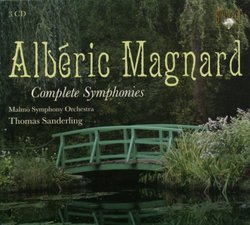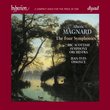| All Artists: Thomas Sanderling, Malmo Symphony Orchestra, Sanderling Title: Magnard: Symphonies/Malmo SO Members Wishing: 1 Total Copies: 0 Label: Brilliant Classics Original Release Date: 1/1/2008 Re-Release Date: 8/5/2008 Genre: Classical Style: Symphonies Number of Discs: 2 SwapaCD Credits: 2 UPC: 842977037128 |
Search - Thomas Sanderling, Malmo Symphony Orchestra, Sanderling :: Magnard: Symphonies/Malmo SO
 | Thomas Sanderling, Malmo Symphony Orchestra, Sanderling Magnard: Symphonies/Malmo SO Genre: Classical
|
Larger Image |
CD DetailsSimilar CDs |
CD ReviewsSym. #3 should be in the standard repertoire R. P. Lewis | Pennsylvania USA | 01/16/2009 (4 out of 5 stars) "I bought this set for the third symphony and I simply don't understand why that piece isn't in the regular rotation at concerts and on classical radio stations. It's a terrific late-Romantic symphony, if that's what you enjoy, as I do. The opening theme is unlike anything I'd heard before. I'm a huge Bruckner fan, and Magnard's sometimes-nickname, the "French Bruckner," is deserved to some degree, especially in the chorale writing for brass. The other symphonies are fine, but not as consistently engaging as the 3rd. I give the set 4 stars because the sound quality isn't the best -- not bad, but not top-notch." Late romantic French symphonic masterpieces Robert Coulter | Delaware, USA | 05/18/2010 (5 out of 5 stars) "Originally released on the BIS label in two separate installments -- 1 and 3 and 2 and 4 -- Brilliant Classics have now put out Thomas Sanderling's first rate readings of Alberic Magnard's symphonic cycle in a single, budget priced release of 3 discs. Magnard's four symphonies effectively stand as the centerpiece of his life's work, which amounts to only 22 works with opus numbers in any case (some unpublished works were destroyed in the fire in which he died -- you can read about his tragic ending elsewhere). Though not particularly progressive for their time, each of his symphonies are French masterpieces of the genre; in my view they rate roughly on par with the symphonic cycle Roussel was to produce not long after. While both Magnard and Roussel are essentially classicists at heart, Magnard's style is a little heavier than that of his countryman. However, he is still not quite in the dense Germanic orchestral style of say Bruckner and Mahler, both of whom he is often compared to (I'd have to say a little unfairly, too, as Magnard clearly has his own voice; the development of his individual style is clear as you progress through these four symphonies). It is a great pity that while many of the great post-war European conductors recorded many of the orchestral works of Roussel, only the Swiss conductor Ansermet was to commit any of Magnard's symphonies to tape -- the third symphony, now available on the budget-priced Eloquence series. Fortunately for us, Thomas Sanderling (and yes, he is the son of the great conductor Kurt Sanderling) has given us these reference recordings in first class sound. There are already some very good reviews of the original BIS releases, so for more information to tempt your purchase-clicking finger I suggest you have a look-see on those pages. Magnard's symphonies are outstanding -- ils sont magnifiques! (in my rusty French) -- and well worth the investment of your time and (scandalously little) money; an unreserved "buy" recommendation." The Best now at Budget Price! Robin Dalziell | West leederville, Western Australia Australia | 03/15/2010 (5 out of 5 stars) "That you can now purchase this wonderful music at budget price is terrific!
Hopefully it will bring Magnard's symphonies to the wider audience they deserve. I can only reiterate what I wrote in my reviews when these recordings were first released and recommend that you read Mr Liscomb's insightful reviews, also of the originals. 'Having listened to Plasson's renditions of these masterly scores since the early 1990's, I was left the sense that 'the whole story was not being told'. How excited I was when I saw that a new cycle was available on Hyperion conducted by Jean-Yves Ossonce. Sure the sound is far better and the orchestral sound heftier, but the interpretation still left my desire for the 'real' Magnard unrequited until... Thomas Sanderling, the Malmo Symphony Orchestra and BIS! Make no mistake; these are symphonies of the most considerable merit. Magnard's craftsmanship is masterly. The orchestration is inspired whether the mood is dark and concentrated - which it often is or lyrical. Wagner was one of his models, as was his teacher d'Indy, and you can certainly recognise the Germanic qualities of these works. However, from the first symphony on Magnard's own 'voice' is everywhere in evidence. Sanderling is very much inside the symphonies and communicates their depth, inventiveness and individuality like no other. A reading of Mr Lipscomb's review will enlighten you as to many wonders of these works - any repetition on my behalf would be overkill. Just do yourself a favour and purchase the 4 symphonies as conducted by Sanderling and discover things about symphonic writing in the 20th century you didn't know before At last, a fitting tribute to genius!' (May '07) " |

 Track Listings (8) - Disc #1
Track Listings (8) - Disc #1
![Ferdinand Ries: Complete Symphonies [Box Set]](https://nationalbookswap.com/cd//m/66/5166/6145166.jpg)


![Weingartner: Symphony 2 [Hybrid SACD]](https://nationalbookswap.com/cd//m/78/3878/6133878.jpg)